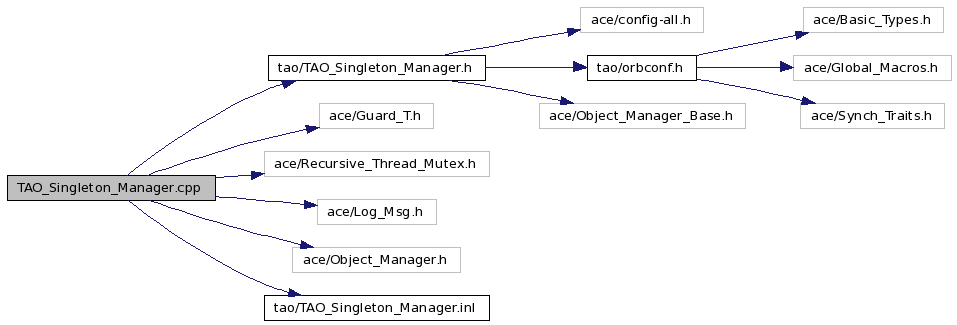
#include "tao/TAO_Singleton_Manager.h"#include "ace/Guard_T.h"#include "ace/Recursive_Thread_Mutex.h"#include "ace/Log_Msg.h"#include "ace/Object_Manager.h"#include "tao/TAO_Singleton_Manager.inl"Include dependency graph for TAO_Singleton_Manager.cpp:

Go to the source code of this file.
Functions | |
| exit_info_ () | |
| registered_with_object_manager_ (-1) | |
Variables | |
| TAO_Singleton_Manager * | the_instance = 0 |
| exit_info_ | ( | ) |
| registered_with_object_manager_ | ( | - | 1 | ) |
Definition at line 50 of file TAO_Singleton_Manager.cpp.
References ACE_NEW, TAO_Singleton_Manager::init(), TAO_SYNCH_RECURSIVE_MUTEX, and the_instance.
00054 { 00055 #if defined (ACE_MT_SAFE) && (ACE_MT_SAFE != 0) 00056 ACE_NEW (this->internal_lock_, 00057 TAO_SYNCH_RECURSIVE_MUTEX); 00058 # endif /* ACE_MT_SAFE */ 00059 // Be sure that no further instances are created via instance (). 00060 if (the_instance == 0) 00061 { 00062 the_instance = this; 00063 } 00064 00065 // @@ This is a hack. Allow the TAO_Singleton_Manager to be registered 00066 // with the ACE_Object_Manager (or not) in an explicit call to 00067 // TAO_Singleton_Manager::init(). However, once the explicit call is 00068 // made, it will not be possible to alter the setting. 00069 int register_with_object_manager = -1; 00070 (void) this->init (register_with_object_manager); 00071 }
TAO_Singleton_Manager* the_instance = 0 [static] |
Definition at line 21 of file TAO_Singleton_Manager.cpp.
Referenced by TAO_Singleton_Manager::at_exit_i(), TAO_Singleton_Manager::fini(), TAO_Singleton_Manager::init(), TAO_Singleton_Manager::instance(), registered_with_object_manager_(), TAO_Singleton_Manager::shutting_down(), and TAO_Singleton_Manager::starting_up().
 1.4.7
1.4.7